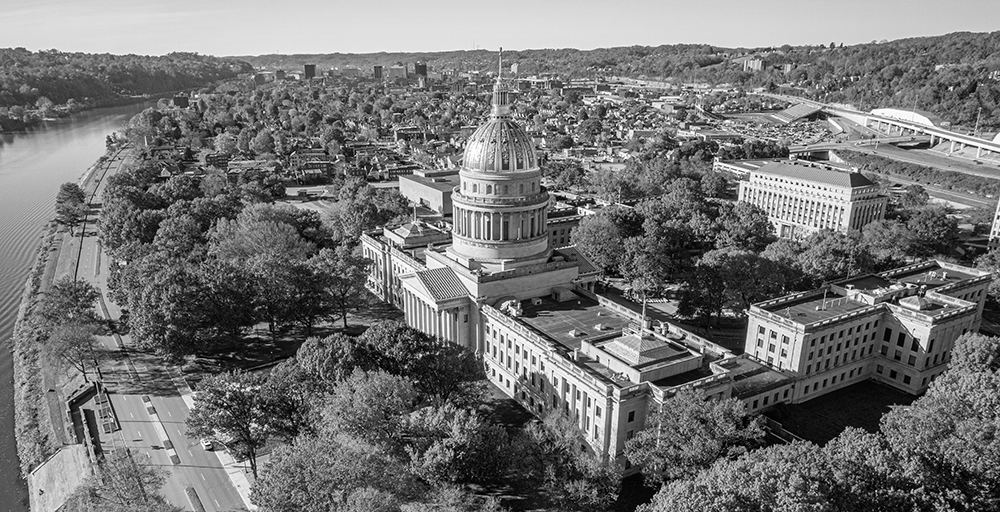On Saturday, April 12, the West Virginia State Legislature adjourned its regular session Sine Die. The session lasted 60 days. The legislature introduced 2460 bills, and 249 bills passed both chambers. So far, Governor Patrick Morrissey (R) has signed 31 measures from this session.
In his inaugural address on January 13 of this year, Governor Morrisey outlined his goals for the state, which he hoped to achieve by partnering with President Donald Trump. The Governor’s priorities included promoting West Virginia’s natural gas and coal industries, establishing high-speed broadband, lowering the state income tax, and streamlining the government by establishing a West Virginia DOGE program.
Making West Virginia Healthy Again
Introduced by Republican Delegate Adam Burkhammer, HB 2354, which bans certain products from food in the state, was signed by Governor Morrisey on March 24. The measure bans the sale of food containing several chemicals across the state beginning January 1, 2027, and also targets food dye in meals provided through school nutrition programs beginning August 1, 2025. Violation of the measure qualifies as a misdemeanor, and individuals can be punished with a fine of up to $500 or jail time.
Supporters of the bill claim it aligns with President Trump’s “Make America Healthy Again” movement, which the Governor has been supportive of. HHS Secretary Robert F. Kennedy Jr joined the Governor in a press conference discussing the bill on March 28, signaling his approval and indicating the possibility of more federal action in line with the Make America Healthy Again movement. Those in opposition to the measure fear how items at the grocery store could be affected, leading to increased food prices.
The issue of food additives and dyes has been popular across the country in 2025. Legislation has been introduced in introduced in 29 states either prohibiting the sale of food products containing these additives or regulating the sale of food products containing these dyes in schools. A bill with comprehensive additive restrictions has since been signed in Arkansas. Bills regulating the sale of foods containing these additives in schools have been signed in Arizona, Utah, Virginia with an additional bill pending executive approval in Tennessee. A handful of similar bills are moving swiftly through legislatures, most notably SB 25 in Texas.
Data Centers
HB 2014, which creates the “Microgrid Development Program”, was introduced by Delegate Roger Hanshaw (R) on behalf of Governor Morrisey. The bill has made it to the Governor’s desk and awaits his signature by May 2. The bill aims to attract industrial businesses and “high impact” data centers to the state, along with microgrids fueled by the state's energy resources to power the data centers. The measure offers regulatory exemptions within designated microgrid districts, protects the construction of such data centers and microgrid districts, establishes a special valuation and tax distribution framework for the data centers, and creates a fund for electric grid stabilization.
The measure was sent back and forth between the chambers on the last day of the legislative session. While members on both sides of the aisle expressed excitement for West Virginia to become a more competitive industry hub, both parties also expressed concern for the bill’s removal of local control of zoning ordinances. The Senate concurred with the House’s amendments and passed the measure in a 32-1 vote on Saturday night.
It is likely the Governor will sign the bill into law, given his vocal support for the measure. In an interview after the legislature's vote, Governor Morrisey called the measure the “economic development bill of the session” and encouraged companies to come to West Virginia to build their data centers due to the state's abundant forms of energy. Data center and microgrid regulation has been a priority issue across the nation. Legislators in Virginia, California, Maryland, Texas, Utah, Georgia, Minnesota, Connecticut, Maine, Oregon, and Arizona have introduced legislation this year to study and regulate data centers.
Budget
A theme of Governor Patrick Morrisey’s inaugural address was a focus on reining in government spending and eliminating waste. For Fiscal Year 2026, the state will have a projected deficit of roughly $400M. That number is expected to increase in the future. According to the Governor’s office, there are several factors driving the deficit, including a structural deficit built into the baseline of the budget, several one-time surplus appropriations, and funding for the West Virginia Public Employees Insurance Agency (PEIA).
The budget for fiscal year 2026 has yet to be approved by the Governor, but it includes funding for state financial aid, digital education, infrastructure improvements, CHIP and Medicaid benefits, and workforce development. Funding for historic preservation, teachers’ professional development, and Community and Technical Education Workforce Development Grants were amended out of the budget. Since the legislature has adjourned Sine Die, the Governor has until May 2 to sign or veto this budget.
A Look Ahead
After the legislature adjourned on April 12, the Governor said the legislature is likely to hold some special sessions this year. Specifically, the legislature will likely address education and the WV PEIA after Senate Bill 506 failed to pass this year. The bill aimed to tie teacher pay to the regional median housing prices. Governor Morrisey has spoken at length about the importance of making teachers’ salaries competitive in the state. The legislature is also likely to tackle rising costs of medical care and pharmaceuticals related to the Public Employees Insurance Agency, where a 5 year outlook done by WV MetroNews shows an overall 60% increase in costs. Additionally, several interim committees are expected to meet June 22-24, but schedules for such meetings have not been released yet.
